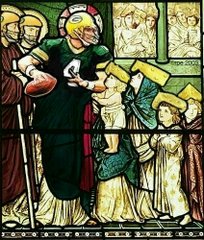 Prayer
PrayerAlmighty God, grant that in the midst of our failures and weaknesses we may be restored through the passion and intercession of Your only begotten Son, who lives and reigns with You and the Holy Spirit, one God, now and forever.
Devotional Reading
... it is the sweetest comfort that sin, which made its habitation in human flesh, was condemned in the same human flesh, in the person of Christ. Our body is the body of death, but in that same body of ours which the Son of God assumed from us, death was again destroyed. Although our sins have separated us very far from God (Is. 59:2), so that we have been alienated from the grace, righteousness, and life of God (Eph. 2:12), yet the Son of God has brought very close to us those heavenly blessings which had been removed far from us (Eph. 2:13-19), laying them before us through His incarnation in the flesh which is of the same substance with our own, so that of His fullness we have received grace for grace (John 1:16). This is the most comforting and salutary exchange, that the Son of God has received from us a human nature and sanctified and blessed and exalted and glorified it in His own person.
Moreover, in His Holy Supper He joins Himself to us in that flesh, so that we may be strengthened by this most certain pledge of the salvation and glorification of our nature; for He does not blush to call us brothers. Therefore, because we are such, He also joins Himself to us in that flesh and blood (Heb. 2:14). Flesh brought death into this world and, again, the flesh of the Son of Man was given for the life of the world in order that he who eats the flesh of Christ may have eternal life. (John 6:54)
– Martin Chemnitz, second-generation Lutheran theologian, reformer, churchman, and confessor. In the Lutheran tradition he is known as Alter Martinus, the "Second Martin": Si Martinus non fuisset, Martinus vix stetisset ("If Martin [Chemnitz] had not come along, Martin [Luther] would hardly have survived") goes a common saying concerning him.
Catechesis
Luther's Large Catechism
V. The Sacrament of the Altar
1 Just as we have heard about Holy Baptism, so we must also speak about the other Sacrament, in these same three points: What is it? What are its benefits? and Who is to receive it? And all these points are established through the words by which Christ has instituted this Sacrament. 2 Everyone who desires to be a Christian and go to this Sacrament should know them. For it is not our intention to let people come to the Sacrament and administer it to them if they do not know what they seek or why they come. The words, however, are these:
3 Our Lord Jesus Christ, on the night He was betrayed, took bread, and when He had given thanks, He broke it and gave it to the disciples and said, “Take, eat; this is My body, which is given for you. This do in remembrance of me.”
In the same way also, He took the cup after supper, and when He had given thanks, He gave it to them, saying: “Drink of it, all of you; this is My blood of the new testament, which is shed for you for the forgiveness of sins. This do, as often as you drink it, in remembrance of Me.”
4 Here also we do not wish to enter into controversy and fight with the defamers and blasphemers of this Sacrament, but to learn first (as we did with Baptism) what is of the greatest importance. The chief point is God’s Word and ordinance or command. For the Sacrament has not been invented nor introduced by any man. Without anyone’s counsel and deliberation it has been instituted by Christ. 5 The Ten Commandments, the Lord’s Prayer, and the Creed keep their nature and worth, even if you never keep, pray, or believe them. So also this honorable Sacrament remains undisturbed. Nothing is withdrawn or taken from it, even though we use and administer it unworthily. 6 Do you think God cares about what we do or believe, as though on that account He should allow His ordinance to be changed? Why, in all worldly matters everything stays the way God has created and ordered it, no matter how we employ or use it. 7 This point must always be taught, for by it the chatter of nearly all the fanatical spirits can be repelled. For they regard the Sacraments, unlike God’s Word, as something that we do.
8 “Now, what is the Sacrament of the Altar?”
Answer, “It is the true body and blood of our Lord Jesus Christ, in and under the bread and wine, which we Christians are commanded by Christ’s Word to eat and to drink.” 9 Just as we have said that Baptism is not simple water, so here also we say that though the Sacrament is bread and wine, it is not mere bread and wine, such as are ordinarily served at the table [1 Corinthians 10:16–17]. But this is bread and wine included in, and connected with, God’s Word.
10 It is the Word, I say, that makes and sets this Sacrament apart. So it is not mere bread and wine, but is, and is called, Christ’s body and blood [1 Corinthians 11:23–27]. For it is said, “When the Word is joined to the element or natural substance, it becomes a Sacrament.” This saying of St. Augustine is so properly and so well put that he has scarcely said anything better. The Word must make a Sacrament out of the element, or else it remains a mere element. 11 Now, it is not the word or ordinance of a prince or emperor. But it is the Word of the grand Majesty, at whose feet all creatures should fall and affirm it is as He says, and accept it with all reverence, fear, and humility [Isaiah 45:23; Philippians 2:10].
12 With this Word you can strengthen your conscience and say, “If a hundred thousand devils, together with all fanatics, should rush forward, crying, ‘How can bread and wine be Christ’s body and blood?’ and such, I know that all spirits and scholars together are not as wise as is the Divine Majesty in His little finger” [see 1 Corinthians 1:25]. 13 Now here stands Christ’s Word, “Take, eat; this is My body.… Drink of it, all of you; this is My blood of the new testament,” and so on. Here we stop to watch those who will call themselves His masters and make the matter different from what He has spoken. It is true, indeed, that if you take away the Word or regard the Sacrament without the words, you have nothing but mere bread and wine. 14 But if the words remain with them, as they shall and must, then, by virtue of the words, it is truly Christ’s body and blood. What Christ’s lips say and speak, so it is. He can never lie or deceive [Titus 1:2].
15 It is easy to reply to all kinds of questions about which people are troubled at the present time, such as this one: “Can even a wicked priest serve at and administer the Sacrament?” And whatever other questions like this there may be. 16 For here we conclude and say, “Even though an imposter takes or distributes the Sacrament, a person still receives the true Sacrament, that is, Christ’s true body and blood, just as truly as a person who ‹receives or› administers it in the most worthy way.” For the Sacrament is not founded upon people’s holiness, but upon God’s Word. Just as no saint on earth, indeed, no angel in heaven, can make bread and wine be Christ’s body and blood, so also no one can change or alter it, even though it is misused. 17 The Word by which it became a Sacrament and was instituted does not become false because of the person or his unbelief. For Christ does not say, “If you believe or are worthy, you receive My body and blood.” No, He says, “Take, eat and drink; this is My body and blood.” Likewise, He says, “Do this” (i.e., what I now do, institute, give, and ask you, take). 18 That is like saying, “No matter whether you are worthy or unworthy, you have here His body and blood by virtue of these words that are added to the bread and wine.” 19 Note and remember this well. For upon these words rest all our foundation, protection, and defense against all errors and deception that have ever come or may yet come.
Concordia : The Lutheran Confessions. Edited by Paul Timothy McCain. St. Louis, MO : Concordia Publishing House, 2005, S. 433






No comments:
Post a Comment